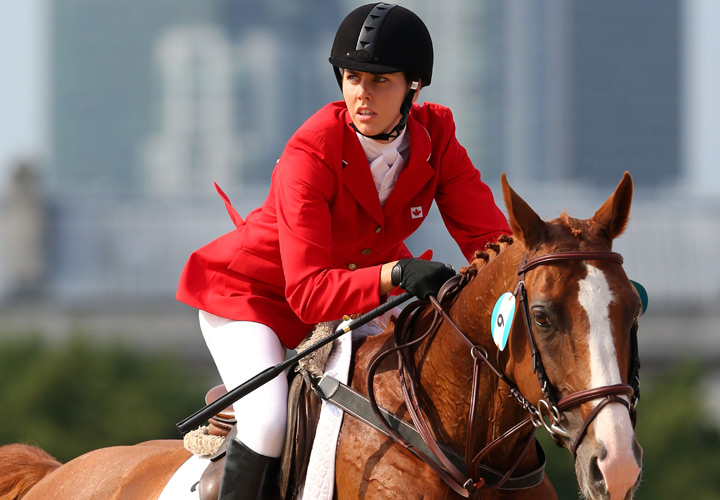Some athletes spend their whole lives training to be the best at one thing: a 200-metre sprint, say.

And some, like Melanie McCann, work to be Olympic-caliber athletes in five very different events.
McCann is representing Canada in the modern pentathlon, meaning she will fence, swim, ride, run and shoot — all in one day.
“We call ourselves the most all-around athletes at the Games and I think lots of people would agree,” she said.
“That’s what makes me a good pentathlete (…) because I’m good across the board. I have a very wide range of skills. I might not be great at one particular sport, but to be consistent and good at all of these completely unrelated events is really what challenges.”
One of the biggest challenges is mental. Doing five different sports in one day requires athletes to quickly switch their focus, so they’re able to do their best in whatever event they’re performing in at that time.
“That’s really what makes a good pentathlete great, when they can separate the events and separate the skills,” said McCann. “Even if you had one bad event that didn’t go as you had planned, you just switch gears and focus on the next event. Anything can happen in pentathlon and it really can still turn into a good day for you.”
Training schedules
McCann admits her training schedule is “a lot to coordinate.”
She usually practices three or four events a day, splitting her time into morning and afternoon sessions with a break in between. “It’s definitely a full-time gig,” she said.
“The training is crazy but it’s what I know and what I love and it is really what I love about the sport. I like the variety and how hard it is and I like how every day can be really different.”
During the off-season, she focuses on the “physical” events – running and swimming – to develop her strength and endurance. As she gets closer to competition, she turns more to the “technical” events – fencing, riding and shooting – because they can be very important during the competition.
“If you miss two or three fencing touches, that can be the end of the day right there,” she said.
But some skills are broadly applicable across all the events, she thinks. The stamina that she develops while running and swimming helps her last through the long fencing event, and the focus she develops during the combined running and shooting event can help a lot too.
“When you’re running really hard and you’re hurting hard and then you have to stop at the shooting range and focus so intensely on your sight to be able to hit that target, that’s just a whole other world of forgetting about the pain and bringing your focus to where it needs to be. You can kind of apply those techniques under pressure in fencing or when it’s really hurting in swimming and you have to still make it to the wall.”
McCann says she’s excited to represent Canada at the Rio Olympics and she likes her chances. “I’m stronger, fitter, faster and more mentally prepared than I’ve ever been in my life. Feeling that about myself and feeling so prepared is a really good feeling. It’s a confidence boost. I feel I’m ready to perform on the day.”
How the modern pentathlon works
McCann’s favourite event is fencing, which is the first event of the competition. “I love the tactical combat against another athlete one-on-one. It’s really quite a cool sport, mentally and physically.”
Athletes get points based on their fencing success. Then, they do a 200-metre swim and earn more points based on their time.
“Ironically enough, I actually began as a competitive swimmer first and foremost and that ended up being my weakest event and least favourite event after all these years,” she said.
Then, athletes compete in an equestrian show jumping event, to earn more points. Unlike most equestrian athletes though, pentathletes aren’t riding their own horses. They’re randomly assigned. “We meet our mount 20 minutes before we have to perform,” she said.
All the points earned during the first three events — plus a fencing bonus round — are added together to come up with start times for the last combined running and shooting event. The person with the most points starts first, and the other athletes get start times based on their total points. Every point they’re behind the leader delays their start time by one second.
The athletes begin with a short scramble to the pistol shooting range. They can leave the shooting range after they have hit five targets or after 50 seconds (a good shooting score is more in the 10-15 second range). Then, they do an 800-metre run, then start shooting again. They do four rounds of running and shooting, for a total distance of 3200 metres.
The first person to cross the finish line at the end is the winner.
The modern pentathlon event in Rio starts with a fencing ranking round on August 18, and the main women’s competition is on August 19. The main men’s competition is August 20.





Comments